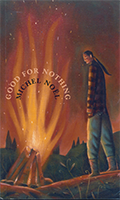 Summary: Fifteen year-old Nipishish comes home to life on the reserve from residential school with a lot of anger. Unsure of his place and his future, he is directed by the Canadian government to attend high school in another town and live with a foster family, but while the abuse has ended, Nipishish continually comes up against blatant racism. Caught between the world of the white man and the world of the Natives as a Métis, Nipishish has to work twice as hard to figure out who he is and how he fits in. A mystery involving his father’s death helps him clarify his own identity, and ends up leading to opportunities he never thought possible.
Summary: Fifteen year-old Nipishish comes home to life on the reserve from residential school with a lot of anger. Unsure of his place and his future, he is directed by the Canadian government to attend high school in another town and live with a foster family, but while the abuse has ended, Nipishish continually comes up against blatant racism. Caught between the world of the white man and the world of the Natives as a Métis, Nipishish has to work twice as hard to figure out who he is and how he fits in. A mystery involving his father’s death helps him clarify his own identity, and ends up leading to opportunities he never thought possible.
Number of Pages: 322
Age Range: 16-18
Review: Despite being told by his teachers and society that he is good for nothing, fifteen year-old Nipishish finds and fans the flame of pride within himself, claiming his proud Indian heritage as a guiding force in his life. Although his Métis status makes him an outsider, he is fortunate to be surrounded by the love of his aunt Manie, and Pinamen, his partner, as well as other members of the Indian community.
But it’s 1959, and racism against Indians is so ingrained that it would be easy to understand if Nipishish did decide to drink his life away, especially after his experiences at a residential school, but he doesn’t. Instead, he keeps trying to do what he thinks is right, being there for his family, getting back to his Indian roots, and standing up against the injustice he’s facing. His Métis status changes from a liability to an asset as he becomes a new leader among his people, able to transcend the white world to fight for Indian rights.
Michel Noël’s writing is stunning in its beauty. Not only does he provide his readers with a character to care about and root for; he provides breath-taking imagery and detail of traditional Indian practices. I was completely caught up in Nipishish’s story, which is why I found its 322 pages to be such a quick read. They just flew by.
I love the image I have now of Nipishish and Pinamen, facing the winter in their little cabin, living off the land with their dogs and anticipating the birth of their first child. They face the dangers of living in the wilderness on a daily basis, but their happiness is complete in having purpose and each other.
Good For Nothing is a sensitive and informative look at Indian/white relations in the late 1950s and early 1960s. Nipishish courageously explores who he is through investigating his parents’ histories and rejecting negative opinions about Indians, and I felt honoured getting to witness his coming-of-age.
Memorable Quotes:
“It’s not true that everything is fine. I feel like a deer, fleeing after it has been wounded by a hunter. My heart won’t stop pounding. I want to run deep into the woods and roll in the damp spring earth and like my wounds.” – Nipishish from Good For Nothing by Michel Noël, page 11
“‘They took our sons and daughters so they could ‘educate’ them in residential schools. They took them against our will, by force and with lies. We were deceived and today, I ask you, what has happened? Our children don’t know how to live like Indians. They no longer speak our language, they don’t recognize us any more and we don’t know who they are. But they are still our children, our flesh and blood! They are ashamed of their ancestors and they disown us without daring to say it. It saddens me when I see how we have become strangers in our own land.'” – Basile from Good For Nothing by Michel Noël, page 20
“‘Often, in life, when we are upset or troubled, when we don’t know what to think or who to talk to, the simple act of taking a piece of paper and a pencil and writing can do us enormous good. Writing things down lets us talk to ourselves, helps us understand who we are, where we come from and what we are heading for…'” – Monsieur Thibeault from Good For Nothing by Michel Noël, pages 119-120
“I was full of hope when I came to live in town. I thought I could bury the horrible memories that were haunting me on the reserve. I thought I would be able to sleep without nightmares, but I was wrong. The memories stick to my skin. Here I’m alone and useless. I’m a misfit, a good for nothing, and I feel as if there’s no place on this mother earth where an Indian like me can fit in.” – Nipishish from Good For Nothing by Michel Noël, page 122
“‘Our ancestors were brave men,’ Tom always says. ‘But who will be our heroes now? We are sick and we no longer know how to cure ourselves. We wallow in our dependency and our fear. We hide behind the filthy curtains of our wooden houses. We hardly dare peek outside when a white man walks by. We spit our hate and our despair onto our own floors. We bury our heads in the ground because we are ashamed of what we have become.'” – Tom from Good For Nothing by Michel Noël, pages 171-172
“Some say the government is paying us to use our land. Others say that the money will help us out of our misery, so we can live like the whites. But now I see that it’s all lies and deceit, like decoys. The money they give us only keeps us down even more. We are like cows and sheep that depend on the farmer to come and feed them every day.
The thought makes me feel sick. How did we get to be like this?
We have to find the pride that has been forced back into some deep part of ourselves. The whites abused the age-old patience of the elders, but I know that deep down, our pride has not been extinguished.
It burns there like an ember waiting for a brisk wind to fan the flame.
And I swear, the first chance I get, I will be that wind.” – Nipishish from Good For Nothing by Michel Noël, pages 173-174
“I start to laugh the way I laughed when I was little. But now I’m a man. I know that I’ll never forget the residential school, the jail, but I like myself the way I am, and I know that I will follow my road right to the end, with pride and respect, no matter what the cost.” – Nipishish from Good For Nothing by Michel Noël, page 192
“Louis Riel was a Métis, just like me. He was born in 1844, exactly a hundred years before me. He wrote that one’s homeland is the most important thing in the world, and to take it from its people is as terrible as snatching little children from their mother just when they need her most. And that the government of Canada is guilty of doing exactly that to the Métis people.” – Nipishish from Good For Nothing by Michel Noël, page 194
“Manie has given us back our pride. For once I feel like a worthy descendant of my Anishnabe ancestors. I am a man with a great lineage. The earth, the water, the air are my very flesh, my breath, my blood.” – Nipishish from Good For Nothing by Michel Noël, page 213
“The wooden floor is freezing on my feet. It’s cold this morning. Winter has settled in for good.
I’m happy. A pale band of frost makes a pattern like transparent ferns on the window. Through the door you can see the silent valley. The trees stand like stone statues. Light flakes of snow dance on the wind in the frosty air.
The lake has turned white during the night. Trails of powder run down its back, mingle with the alders on the shore and swirl up to the tousled heads of the spruce trees.” – Nipishish from Good For Nothing by Michel Noël, page 245
“‘Tonight we Anishnabe are moose, because we are eating its flesh. It gives us life, and its blood mixes with our own. Be grateful to the forest, the mountain, the lakes, the earth, the stars and to all the animals in the universe who share their riches with us. Tonight we are all one. Let us live in respect for each other. Kitchi miguetch, thank you.'” – Old Mathieu from Good For Nothing by Michel Noël, pages 271-272
“But I am happy to see the coming of spring, to hear the water surge in the swollen veins of the earth, to wake up in the morning to the low, raucous song of the snow geese, to put my canoe in the water. Still, my heart will always skip of a beat when I think of winter. If its call is too strong, we will come back – Pinamen, the baby and me – to live with it again.” – Nipishish from Good For Nothing by Michel Noël, page 307
Good For Nothing by Michel Noël is published by Groundwood Books (1999, translated into English by Shelley Tanaka in 2004).
(Buy this book: Amazon | Indigo
| Canadian Booksellers)




 Amy Mathers has been passionate about reading from a very young age, and hopes others will share her enthusiasm for funding a teen book award.
Amy Mathers has been passionate about reading from a very young age, and hopes others will share her enthusiasm for funding a teen book award. 





